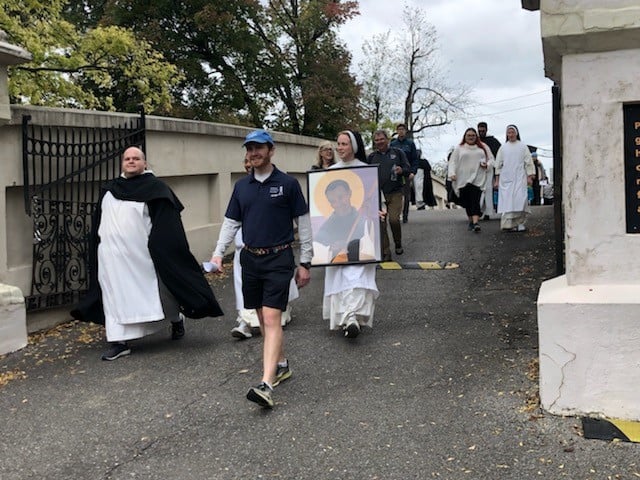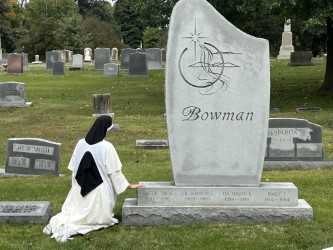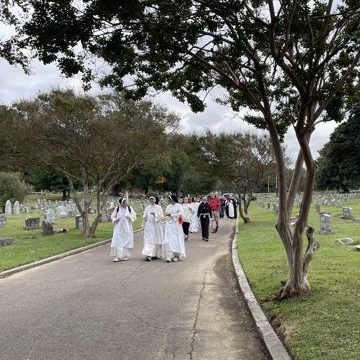Walking With Martin: Pilgrimage to Memphis, TN
Posted on Monday, January 3, 2022
by Sister Mary Rachel Capets, O.P. and Sister Eva Marie Gorman, O.P.
When we hear of the great Catholic tradition of pilgrimage, we usually think of Rome, Lourdes, or the Camino de Santiago in Spain—but not of Memphis, TN. We associate Memphis with the civil rights movement, and rightly so, given the city’s weighty history. Under the influence of Christianity, and led by Dr. Martin Luther King Jr. and countless unsung heroes, the civil rights movement saw some of its most important events in Memphis, from the Sanitation Workers’ Strike of 1968 to the tragic assassination of King. Catholic social teaching has always supported civil rights, prizing the dignity of each human person as its most fundamental principle. Memphis may be a place of profound historical and even spiritual importance—but is it a pilgrimage site?
Last October, it was. Several Aquinas College students and staff members, as well as other Dominican Sisters of St. Cecilia, travelled from Nashville to Memphis to participate in a one-day pilgrimage offered in reparation for the sins of racial injustice and to pray for reconciliation among all peoples. The pilgrimage was organized as part of a triduum in honor of St. Martin de Porres, sixteenth-century Dominican friar and the patron saint of racial justice. Thus, it seemed that two Martins—St. Martin, and MLK Jr.—accompanied the pilgrims along their way.

Will Peterson, Founder of Modern Catholic Pilgrimage, leads the group of pilgrims along the pilgrimage route. Pilgrims carried images of St. Martin de Porres (Sr. Mary Martin carries an image of St. Martin, pictured above), Martin Luther King, Jr., and Our Lady of Guadalupe. (Photo Courtesy of Modern Catholic Pilgrim)
The pilgrimage, which was led by Modern Catholic Pilgrim and facilitated by the Dominican friars of the Province of St. Martin de Porres, began with a time of prayer at the Cathedral of the Immaculate Conception. The pilgrims were invited to share their intentions with each other during the journey, supporting each other as they walked along the way. This practice, a time-honored tradition of Catholic pilgrimages, created a strong sense of unity among the pilgrims, who hailed not only from Tennessee, but also from Oklahoma, Texas, Kentucky, and even Minnesota. Sr. Lucia Christi Blankartz, O.P. (B.S. ’22) commented on how strongly she could feel “the presence of the universal Church” and reflected on “the experience of pilgrimage as prayer—particularly prayer of intercession.” Another sister noted that, despite the seriousness of the pilgrimage intentions, “there was a sense of joy and hope among the pilgrims.” Walking together, the pilgrims lifted up our nation and the whole world to God, begging for his mercy and healing.
The first stop after the Cathedral was Elmwood Cemetery and the grave of the Servant of God Sister Thea Bowman, a Franciscan Sister of Perpetual Adoration who served as a teacher, musician, and civil rights advocate, leading the Diocese of Jackson’s Office of Intercultural Affairs. After a time of communal and private prayer at Sister Thea’s grave, the pilgrims set out across the city to visit the I Am a Man Plaza, a memorial of the 1968 Sanitation Workers’ Strike, that drew Dr. Martin Luther King, Jr. to Memphis. The plaza bears the names of all the workers involved in the strike, a poignant reminder of the dignity and importance of each human person. As King said in his famous speech in Memphis, “We are saying that we are determined to be men. We are determined to be people. We are saying that we are God’s children.”

The last stop of the pilgrimage was the Church of Sts. Peter and Paul and the Shrine of St. Martin de Porres. Before a statue and relic of the humble Dominican friar, the pilgrims offered their intentions once again. In 1968, Martin Luther King, Jr., assured Memphians, “I’ve been to the mountaintop. . . And I’ve seen the Promised Land. I may not get there with you. But I want you to know tonight, that we, as a people, will get to the promised land!” Now, from his place in the Promised Land of Heaven, St. Martin de Porres presented the pilgrims’ intentions before the throne of God, who eagerly poured out an abundance of grace and encouragement into the heart of each one.
The evening ended with a Mass celebrated by Father Eduardo Logiste, O.P., and a delicious meal of gumbo prepared by the Dominican laity. And yet, for the Aquinas students and staff, the pilgrimage was still not over. No pilgrimage is complete unless one returns from it at least a little changed, and the bus ride back to Nashville provided a time to reflect on how the day’s graces had affected each one. “What is a pilgrimage?” asked Sr. Moana Grace Taufaao (B.S. ’22). “One takes a journey with God and to God, through the companions and circumstances He provides in order to seek Him, and essentially return to Him.” Sr. Eva Marie Gorman, O.P. (B.S. ’21) agreed, calling the trip “a powerful reminder to me that we go to Heaven together; the Lord blesses us with fellow-pilgrims so we can come to Him with each other.”

No doubt about it, the trip to Memphis encapsulated all the hallmarks of a true Christian pilgrimage: an experience of community with fellow-travelers and those already in our final destination; times of solemn reflection and times of joyous laughter; the chance to offer all our intentions in the Sacred Liturgy to the One Who chose to walk among us and lead us back to the Father. Two days after the pilgrimage, the Church celebrated the Solemnity of All Saints, and the first reading from the Book of Revelation foretold “a great multitude, which no one could count, from every nation, race, people and tongue” (Revelation 7:9), praising God. Memphis—that unlikely yet very powerful pilgrimage site—gave the pilgrims a glimpse of this heavenly reality, which we hope to experience for all eternity.
